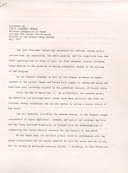The Power Years
Page 1 2 3 4
Regulatory Issues of the 1960s
In spite of this troubling decline, the Railroad Commission worked on some of its most interesting regulatory problems in the 1960s. One case that captured the public’s imagination was the so-called “slant hole” drilling case in East Texas in 1961. A total of 93 wells were found to have been drilled at an angle in order to pump oil from underneath neighboring property. Faced with this new technique of stealing, the legislature passed a law stating that a well could not deviate more than three degrees from the vertical.
The commission also attempted to address the problems of declining production. The major companies had turned their attention to cost-cutting, mergers, and exploiting cheaper foreign sources. Part of this trend was caused by tax policies that continued under both Republican and Democratic presidents. While there were still a number of independent operators, their numbers were falling every year as the majors bought up their properties. Exploration in Texas had fallen to a new low. In 1964, the commission changed the allowables to reward widely spaced wells so fields could be developed with fewer wells and thus a lower cost. Another set of new rules was designed to encourage offshore development. In 1965, a new pooling statute allowed owners to combine smaller tracts of land and drill a single well, sharing the costs and the profits.
The End of an Era
In 1960, the Organization of Petroleum Exporting Countries (OPEC) was formed by the nations of Iran, Iraq, Kuwait, Saudi Arabia, and Venezuela. Eventually, six other nations would join the group, including Qatar, Indonesia, Libya, the United Arab Emirates, Algeria, and Nigeria. These countries wanted to regulate their production in order to keep profits high. Ironically, they modeled many of their strategies on those used by the Texas Railroad Commission. Slowly but surely, OPEC gained discipline as an organization and prepared itself for the day when it could control the international oil market.
The next Mideast crisis, the 1967 Arab-Israeli War, revealed the decline of Texas oil. As in previous times of crisis, Texas ramped up to full production in order to fill the shortage in global crude. For the first time, Texas proved unequal to the challenge. Many mature wells proved incapable of meeting their allowables. It was evident that Texas fields were in decline. William J. Murray, formerly of the Railroad Commission and then president of the Texas Independent Producers and Royalty Owners Association, warned that “there is essentially no net spare efficient producing capacity in this entire nation.”
Murray was proved right in 1971, when a test was conducted to demonstrate Texas’s capacity to produce two million extra barrels a day. The test failed, revealing that the reserve capacity was only one-tenth that amount.
|

Commissioner Jim Langdon's remarks on the energy crisis, 1977
|
The next year, the Railroad Commission abandoned the allowables structure, setting production at 100 percent statewide. Production went up only a few thousand barrels. As another independent producer put it, “It was a desolate truth to be proved right on this – in that we had to admit in the United States that we were suddenly beholden to foreign sources for oil that we had resisted so hard, so futilely for so many years.” If anything happened to global oil supplies, Texas no longer had the capacity to pick up the slack.
To the public at large, this lesson was driven home in 1973. The Yom Kippur War led to an OPEC embargo of oil sales to Israel’s allies. All over the country, Americans waited in gas lines. An energy crisis and spiraling inflation would be an economic bane throughout the decade. Americans had learned that OPEC, not the oil companies and not the Texas Railroad Commission, now controlled international oil prices.
Next Section: Other Responsibilities>>